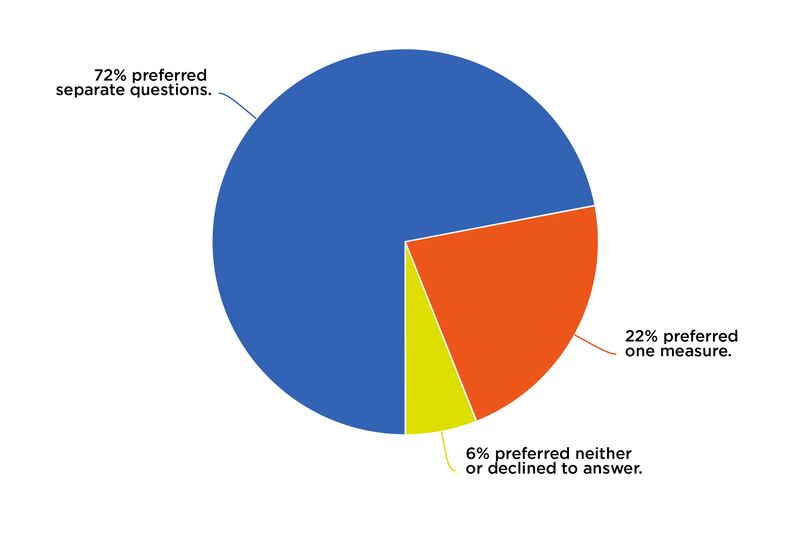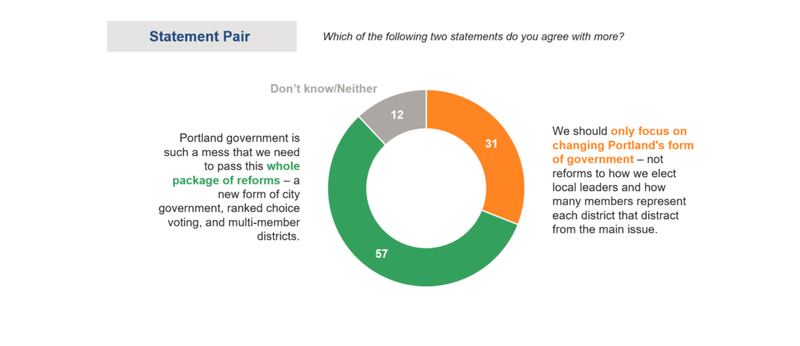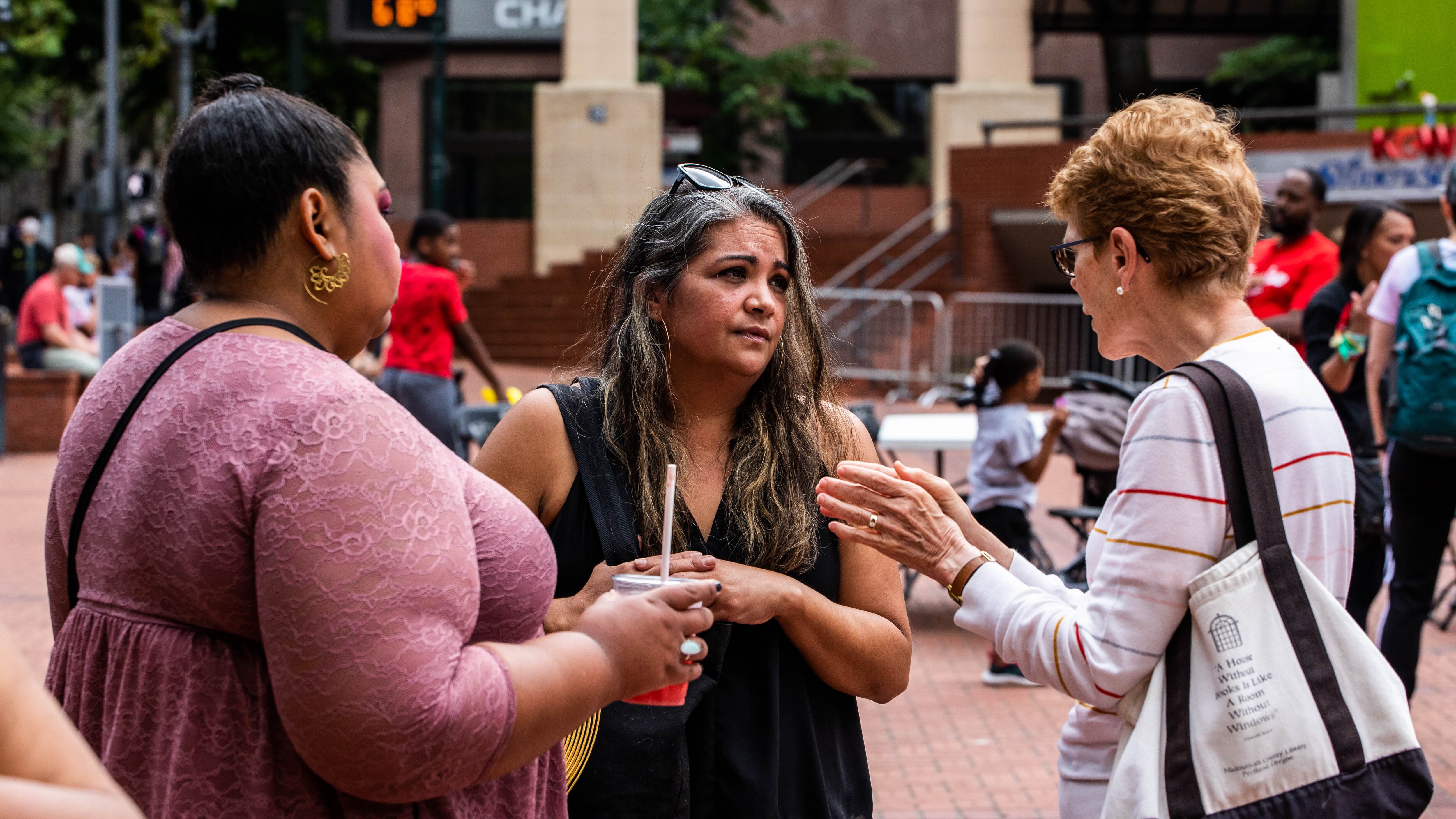In April, the North Star Civic Foundation, a good-government think tank, received results of a poll it had commissioned a month earlier to gauge public sentiment about charter reform to change the city of Portland’s form of government. Less than two months later, the 20-member Charter Commission would send its reform package to the November ballot on a 17-3 vote.
The survey asked 500 respondents—with an intentional overrepresentation of BIPOC Portlanders—such broad questions as whether they wanted a big overhaul of City Hall or only minor tweaks; what voters’ top concerns were regarding government effectiveness; and whether people felt represented by City Hall.
It listed three major reforms the Charter Commission was poised to recommend: ranked-choice voting, multimember geographic districts, and a city administrator form of government.
It asked another question of respondents, one that now appears freshly relevant: Would you prefer to vote on charter reform as separate ballot questions or combined into one measure?

“The groups most in favor of separate proposals are young women, voters in North Portland, and lower-income voters,” pollsters wrote.
The poll’s findings appear to fly in the face of the measure placed on the November ballot by the Charter Commission, which voted overwhelmingly to bundle all three reforms into a single ballot question. Charter commissioners have said the reforms they proposed—a city administrator, ranked-choice voting, and multimember districts—are too interdependent to separate.
The Portland Business Alliance has challenged the single-question measure in Multnomah County Circuit Court. Oral arguments are scheduled for Aug. 11.
The PBA was among the funders of the North Star poll, along with Oregon Smart Growth, the Metropolitan Association of Realtors, and the Home Builders Association of Metropolitan Portland. That was back when the city’s chamber of commerce and its leading business interests were eager to see charter reform—but in a much different form than it’s now taken.
What now appears peculiar is why the complete poll results weren’t presented to charter commissioners in April.
On June 15, Charter Commission project manager Julia Meier sent an email to all Portland City Council chiefs of staff. It linked to three public opinion polls that Meier said were presented to the commission.
The Lake Research poll commissioned by North Star was one of the three listed. But it was a truncated version. That 72% of respondents said they wanted separate ballot questions did not appear in the version sent to City Council offices.
This week, WW obtained the full survey that included that particular question—which was never presented to charter commissioners and never provided to the public.
Caitlin Baggott Davis, executive director of North Star, says the omission was not intentional, but rather her group wanted to focus on the core takeaways from the poll so it could message appropriately when promoting charter reform: “Our focus in the March poll was to understand if voters feel represented by Portland city government, and if they feel that services are being provided well. They don’t. We focused the presentation on that.”
It’s also important to contextualize the period in which the poll was taken: It was before anyone knew that the issue of separate questions versus a combined question would so badly splinter interest groups on charter reform.
Four charter commissioners tell WW they never saw the poll, nor the shorter version.
Commissioner Robin Ye says seeing this question doesn’t change anything for him: “There’s an overwhelming sense of support for big structural change, and the policy proposal from the commission is best and only can be presented in a single package, because that’s how the reform policy works together, in tandem.”
(Sofia Álvarez-Castro, communications coordinator for the Charter Commission, says the truncated version was publicly available but not formally presented to charter commissioners.)
The full Lake Research poll raises a number of questions. Perhaps the biggest one is about transparency: Why was an important question in a public opinion poll not shared with charter commissioners?
Meanwhile, results of another poll presented to charter commissioners in April asked a similar question.
Commissioned by Building Power for Communities of Color, which now leads the campaign to promote the reform measure, and Represent.Us, a nonprofit that advocates ranked-choice voting, the poll asked respondents which of two statements they agreed with more: “Portland government is such a mess that we need to pass this whole package of reforms” or “We should only focus on changing Portland’s form of government.” Fifty-seven percent of respondents chose the former statement, and 31% chose the latter.

(Another poll by FM3 Research, commissioned and funded by North Star and BPCC and presented to charter commissioners in March, asked about combining two of the three proposals. In that poll, adding more than one reform to the ballot question did not hurt, or help, the favorability of either reform.)
North Star, which commissioned the poll that showed voters had doubts, is now joining the campaign to pass the full charter reform package.
The campaign tells WW it’s raised $200,000 so far.

